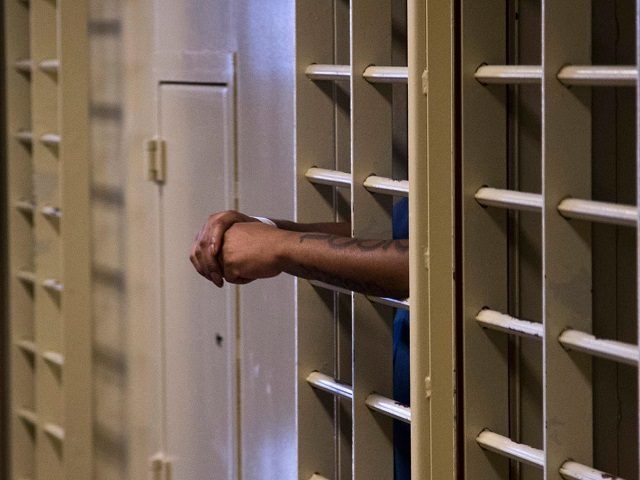A Cuban rapper who sewed his mouth shut last month and is refusing to eat is reportedly in a “delicate” physical state, forcing the repressive communist regime to consider moving him out of prison into a nearby hospital.
Mayquel Castillo Pérez, who raps under the pen name “El Osokbo,” was arrested in September for organizing a concert to protest Decree 349, a law that would ban the creation of any art, public or private, without receiving a license from the communist Ministry of Culture.
El Osokbo declared himself on a hunger strike in November. Cuban political prisoners have a long history of using hunger strikes as a peaceful means of dissent from within prison and many have died of starvation after the government refuses to cede to their demands to be released. Human rights advocates and researchers also confirm that the Castro regime uses food deprivation and starvation as a form of torture with prisoners who do not choose to conduct a hunger strike.
The Miami-based news outlet Radio Martí spoke to a friend and fellow artist of El Osokbo’s, Amaury Pacheco, on Monday, who confirmed that the rapper’s health was deteriorating.
“He has been in the cell [without food] for 3-4 days now,” Pacheco confirmed, noting that El Osokbo had at some point begun to eat again after sewing his mouth shut in November, but had since returned to his hunger strike.
Over the weekend, Pacheco posted on Facebook that guards had moved El Osokbo into a “punishment” cell in the prison, typically a solitary confinement room, to convince him to start eating again. “He is grave, his health is deteriorating rapidly,” Pacheco wrote.
Cuban artists have embraced hip-hop music as an outlet for criticism of the Castro regime, which in January will observe 60 years in power. El Osokbo’s protest inspired another Cuban rapper behind bars – Lázaro Leonardo Rodríguez Betancourt, known as “Pupito en Sy” – to also refuse food until he is free. Pupito en Sy was one of the many artists who signed up to perform in El Osokbo’s illegal anti-communist concert. He is in prison for allegedly assaulting a police officer, a claim for which there are no witnesses. Those who saw the rapper’s arrest have told independent news outlets that they witnessed a group of Cuban officers violently beat Pupito en Sy and arrest him.
In November, reports indicated that the government had already dropped its charges relating to the concert against El Osokbo, yet he remains behind bars. The regime typically punishes dissent behind bars, particularly actions like hunger strikes that can attract international condemnation.
Diario de Cuba, a newspaper based in Spain, reported this week that El Osokbo has met with trouble from the regime in the past. In 2015, he faced legal action after accusing municipal Havana authorities of accepting bribes from criminals in exchange for not filing reports on crimes. He made the claim after becoming the victim of a beating by a group he claimed paid off the police. Instead of charging the assailants, police reportedly charged El Osokbo with desacato, or “disrespect,” a crime typically levied against dissidents on the island.
Now the rapper has become the face of the protest movement against Decree 349, which went into effect last week. The law, written to allegedly “strengthen the socialist system and increasingly more competently satisfy the material and cultural needs of society and citizens,” requires musicians, painters, and all other artists to register as artists legally with the Ministry of Culture. Any artist the ministry deems anti-communist or a threat to the regime will no longer be able to make art in their homes or perform at any venues on the island. Venues that host unregistered artists can also face fines and other legal repercussions.
The news of the rapper’s health demise follows a public dispute between the government of the Trump administration and Raúl Castro’s cronies over human rights abuses perpetrated against political prisoners. Secretary of State Mike Pompeo urged the Cuban government in a letter published Tuesday to offer “substantial” explanations regarding political prisoners and a plan to end the practice of torturing individuals who disagree with the regime.
“The U.S. recognizes the sovereign right of every State to judge and condemn individuals who violate criminal law, but only when they can rely on the guarantee of a fair trial by an independent and impartial court,” Pompeo wrote to Cuban Foreign Ministry Bruno Rodríguez. “This principle, however, does not justify the imprisonment of Cuban individuals for simply exercising their human rights and fundamental liberties, including the freedoms of religion, expression, assembly, or association.”
Miguel Díaz-Canel, Raúl Castro’s second-in-command, responded to the letter on Twitter, writing, “The U.S. has no moral ground to speak of human rights. Its discourse is hypocritical, dishonest.”

COMMENTS
Please let us know if you're having issues with commenting.